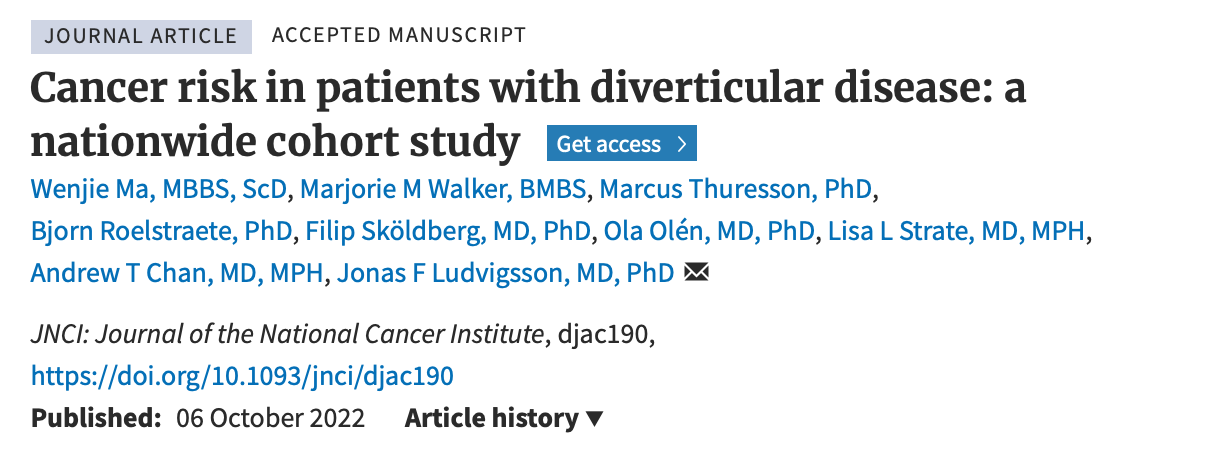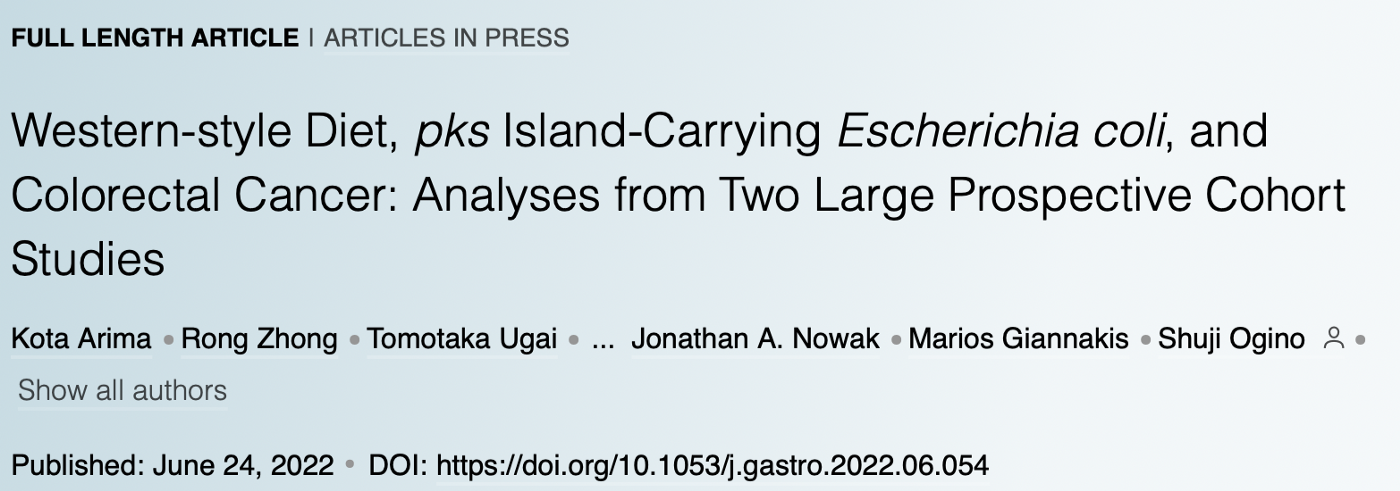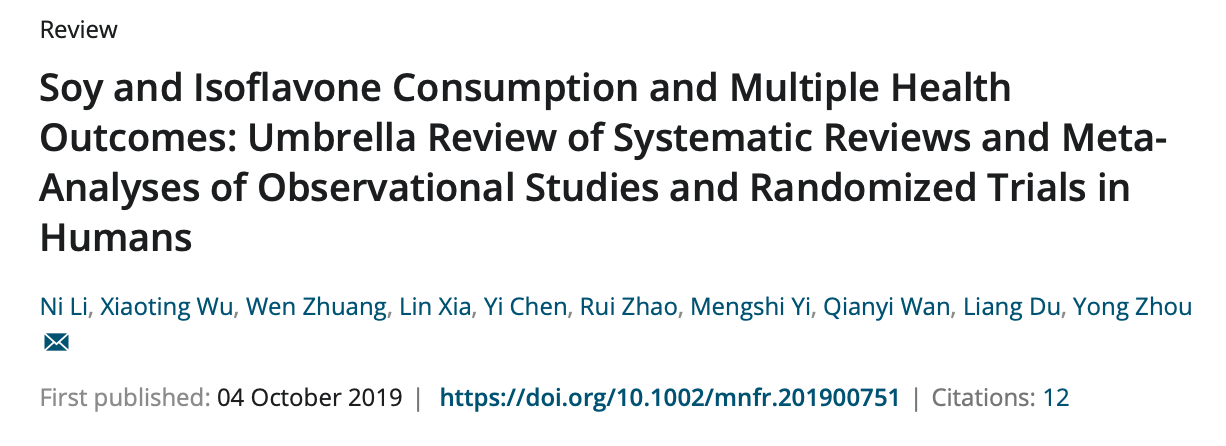A review of the week’s plant-based nutrition news 23rd October 2022
This week I focus on diet, lifestyle and colorectal cancer. This is one of the most preventable cancers, yet rates are rising especially in younger people.
Bowel cancer or colorectal cancer is the 4th most common cancer in the UK with 42,900 new cases every year. Globally, it’s the third commonest cancer. Cancer Research UK states that 54% of cases could be prevented by addressing modifiable lifestyle factors. These factors include maintaining a healthy weight, eating a diet rich in fibre, maintaining regular physical activity, avoiding the consumption of processed and unprocessed red meat, avoiding alcohol and tobacco use and preventing chronic condition such as type 2 diabetes and inflammatory bowel disease.
Bowel cancer is a cancer for which eating a plant-based diet makes a lot of sense. Not only does a plant-based diet mean that you are avoiding known food-related cancer causing agents, including red and processed meat (responsible for 20% of cases of colorectal cancer), but you are consuming foods that a rich in beneficial nutrients that are key to maintaining gut health in general; that is fibre, polyphenols and resistant starches. The health of our gut microbiome is reliant on these nutrients and in turn a healthy gut microbiome is associated with a lower risk of bowel cancer.
It would be remiss of me not to mention that association of dairy consumption with a reduced risk of bowel cancer. But please remember, it’s due to the calcium content. Calcium supplements have the same impact. So, you can get your calcium from healthy plant-based sources. Check out our factsheet here.
The rising rate of bowel cancer in people under the age of 50 years is alarming and thought to be related to our recent change in lifestyle, including the Western diet pattern high in meat and ultra-processed foods and low in healthy plant foods, sedentary lifestyles and the knock-on impact on the gut microbiome.
Here are some studies supporting a plant-based diet for prevention of bowel cancer.

PLANT-BASED DIETS AND GASTROINTESTINAL CANCERS (GI): This huge study assessed the impact of a plant-based diet on the risk of GI cancers and has pretty robust findings that should form the basis of cancer prevention guidelines.The report is a meta-analysis of 49 studies, both cohort (n=18) and case-control (n=31), with >3 million participants mainly from Europe, North America and Asia and assessed the impact of a plant-based diet on the risk of GI cancers. The term ‘plant-based’ included several dietary patterns that emphasise the consumption of healthy plant foods with the reduction or avoidance of animal-derived and processed foods. The study included participants on vegan, semi vegetarian (eat dairy, eggs and some red meat, poultry, and fish >= 1 time/month but <1 time/week), prudent (high intakes of vegetables, fruit, noodle, potatoes, soy products, mushroom, and seaweed), vegetarian, Mediterranean and pesco-lacto-ovo-vegetarian diets.
The results showed that a plant-based diet was protective against the development of GI cancers with a risk reduction in the order of 20–30% Plant-based diets reduced the risk of pancreatic cancer by 29%, colorectal by 24%, rectal by 16%, colon by 12%, gastric by 19%, liver by 39%. The risk reduction was similar in males and females and between geographical areas. The impact of a vegan diet was assessed separately and found to be similar to other plant-based dietary patterns.

FIBRE, WHOLE GRAINS AND BOWEL CANCER: We have known for a long time that fibre is key to optimising gut health and preventing bowel cancer. One of the many seminal observations of Dr Denis Burkitt was around the benefits of fibre for gut and overall health.
This large meta-analysis confirms that there is a dose-response relationship between fibre consumption and the risk of bowel cancer. For every 10g of fibre per day consumed there is a 10% reduction in risk, with a particular benefit for consuming cereal fibre and whole grains. The World Cancer Research Fund also confirms that there is strong evidence that the consumption of whole grains reduces the risk of bowel cancer.

DIVERTICULAR DISEASE AND CANCER RISK: Another condition that is essentially caused by a Western diet, deficient in fibre, is diverticular disease. It turns out that having diverticular disease increases the risk of cancer, according to this new retrospective study which included 75,704 participants followed for a median of 6 years. Patients with diverticular disease have a 33% increased risk of overall cancer, equivalent to one extra cancer case per 16 patients with diverticular disease followed for 10 years. There was also an increase in specific cancer types, including 71% higher risk of colorectal cancer, 72% increased risk of liver cancer, 62% increase in pancreatic cancer and 50% increased risk of lung cancer.
Vegans and vegetarians have a significantly lower of rate of diverticular disease compared to omnivores. In the EPIC-Oxford study, diverticular disease was 27% lower in vegetarians and 72% lower in vegans compared to meat eaters. The intake of dietary fibre was an independent predictive factor, reducing the risk by 41% for those consuming the most. In the Health Professionals Follow-Up Study, men within the highest quintile of fibre intake had a 42% reduction in the risk of developing symptomatic diverticular disease. Red meat and meat consumption in general is associated with an increased risk of diverticular disease. Other risk factors include smoking tobacco, alcohol consumption and obesity. Key components of prevention are diet and lifestyle interventions, specifically a focus on the consumption of high fibre, whole plant foods and minimising red meat consumption.

MEAT AND DNA DAMAGE: This is a really important study. We have known for several years that processed and unprocessed red meat increases the risk of cancer, particularly bowel cancer, but the actual mechanism has been less certain, with many theories proposed.
In this study, DNA was analysed from matched normal and colorectal tumour tissues from 900 patients with colorectal cancer who had participated in one of three prospective cohort studies from the US, the Nurses’ Health Studies and the Health Professionals Follow-Up Study. All participants had previously provided information on their diet, lifestyle, and other factors over the course of several years prior to their colorectal cancer diagnoses.
DNA sequencing data showed different mutation signatures in the different tissues. One particular mutation signature found in the colorectal cancer tissue is associated with alkylation of DNA, indicating a type of DNA damage. This particular alkylating signature was associated with high intakes (more than 150g per day) of processed and red meat prior to the diagnosis of colorectal cancer. However, other dietary factors such as poultry and fish consumption, and lifestyle factors such as body mass index, alcohol, smoking and physical activity was not associated with this alkylating signature. The tumours that displayed the alkylating DNA signature were more likely to have mutations in genes associated with driving the development of colorectal cancer. In addition, this higher level of alkylating damage was associated with a 47% greater risk of dying from colorectal compared to patients with lower levels of damage.
The lead author was quoted by the American Association for Cancer research to say ‘Our study identified for the first time an alkylating mutational signature in colon cells and linked it to red meat consumption and cancer driver mutations. Our data further support red meat intake as a risk factor for colorectal cancer and also provide opportunities to prevent, detect, and treat this disease.’

WESTERN-STYLE DIET AND COLORECTAL CANCER: We already know that a Western-style diet pattern high in red and processed meat, sugar and refined grains/carbohydrates increases the risk of colorectal cancer (CRC). This study suggests that this may be occurring through the negative impact on the gut microbiota leading to DNA damage, inflammation and altered immune surveillance.
Researchers analysed dietary data from more than 134,000 participants from two prospective cohort studies from the US; The Nurses’ Health Study and The Health Professionals Follow-up Study. During the more than 30 years of follow-up, there were 3200 cases of CRC recorded. Genetic analysis was performed on 1,175 of these tumours, specifically looking for the Escherichia coli bacterial strains carrying a distinct genetic island known as polyketide synthase (pks). Pks encodes an enzyme that has been shown to cause genetic mutations in human cells.
The results showed that a Western-style diet pattern was associated with colorectal tumours containing high amounts of pks+ E. coli but not with tumours containing little to no amount of pks+ E. coli. This provides a potential link with the Western-style diet, the gut microbiota and development of CRC.
The impact of diet on gut microbiota is implicated in a number of chronic conditions, including cancers in general. In addition, modification of the gut microbiome in those with a diagnosis of cancer, may be of benefit. This review article provides an excellent summary on the role of the gut microbiome in cancer prevention and survival. The key message is that we can modify our gut microbiome within a few days of making a beneficial dietary change. The beneficial components of the diet to emphasise are foods rich in fibre, resistant starches, polyphenols and to include fermented foods — so all the plants!

LIFESTYLE FACTORS TRUMP GENETICS RISK: This study used data from 346,297 participants in the UK Biobank cohort. Healthy lifestyle scores (HLSs) were constructed using 8 lifestyle factors, according to the American Cancer Society guidelines, and were categorized into unhealthy, intermediate, and healthy groups. These lifestyle factors were BMI (kg/m2), waist-to-hip ratio (WHR), physical activity, sedentary time, processed and red meat intake, vegetable and fruit intake, alcohol consumption, and tobacco smoking. A polygenic risk score (PRS) was created using 95 genetic risk variants. During the 5.8 years of follow-up there were 2066 new cases of CRC.
The results showed that a high HLS was associated with a significantly lower risk of CRC and there was a dose effect. In addition, the reduction in risk was greater in those with a higher PRS. This risk reduction was in the order of 30–50%. The greatest individual risk factors were higher WHR, consumption of red and processed meat, alcohol consumption and tobacco smoking.
Once again, your genes are not your destiny. We talk about personalised medicine for cancer treatment, but the authors conclude that we need to ‘establish personalized preventive strategies for cancer prevention’.

SOYA IS A GREAT ADDITION TO THE DIET: I always like to highlight the benefits of soya as there are still so many myths that persist. There is no doubt that the consumption of minimally processed soya foods is healthy and can reduce the risk of a number of chronic conditions. This huge analysis of all the human data on soya consumption, which includes 114 meta-analyses and systematic reviews reported a significant reduction in the risk of a number of cancers, including ovarian (48% reduction), gastric (37%), prostate (29%), breast (13%), colorectal (24%), endometrial (19%) and lung (17%). Not only that, soya consumption is beneficial for heart health with soya protein lowering LDL-cholesterol levels. Soya also has benefits for bone and kidney health, prevention of type 2 diabetes and for menopausal symptoms in women.

HEALTHY LIFESTYLES, CANCER AND CARDIOMETABOLIC DISEASE: Not only does underlying chronic illness increase the risk of cancer, but there is an increased risk of cardiometabolic disease after a diagnosis of cancer. This makes lifestyle interventions for cancer survivorship increasingly important.
This paper reports finding from the UK biobank study and examines the impact of a healthy lifestyle on the risk for cardiovascular disease (CVD) and type 2 diabetes (T2D) before and after the onset of cancer. Two sub-groups were included. A cancer-free cohort of 397,136 individuals in the general population and a cancer-prevalent cohort of 35,564 individuals with cancer. All participants were aged 40 to 70 years, free of CVD and T2D at recruitment and then followed for median of 14 years. The healthy lifestyle index (HLI) was made up of 5 cardiometabolic disease–related healthy behaviours (smoking status, physical activity, diet, alcohol consumption, and sleep duration). If participants met the criteria for each healthy habit they received a score of 1 and if not a score of 0, so a maximum score of 5 could be obtained. A healthy diet was high in fruits, vegetables, whole grains, refined grains, fish and low in unprocessed meat and processed meat.
In the cancer-free cohort 40,097 individuals (10.1%) developed cancer during follow-up. Each 1-point increment in HLI was associated with an 8% lower risk of developing cancer. A 1-point increment in HLI was also significantly associated with a 10% lower risk for developing CVD in patients diagnosed with cancer and a 12% lower risk in those free of cancer. Each additional healthy lifestyle factor had a 17%-26% reduction in risk of death during follow up, with smoking having the strongest negative impact. A 1-point increment in HLI was also associated with a 19% reduction in risk of T2D and a 16% reduction in T2D following a cancer diagnosis.
In the cancer cohort, cancer survivors with 5 healthy lifestyle factors had a 44% reduction in the risk of developing CVD and 38% reduction in the risk of T2D. A 1-point increment in HLI was associated with risk reductions of 10% and 13% in developing CVD and T2D, respectively.
Overall the findings confirm the importance of healthy lifestyle habits for prevention of cancer, CVD and T2D and also the benefits of these healthy habits after a diagnosis of cancer when the risk of chronic conditions is even higher.
Don’t forget that a plant-based diet is associated with a better outcome after a diagnosis bowel cancer. Higher consumption of plant foods and lower consumption of animal foods is associated with a longer remission and survival.
For practical, actionable information, check out our factsheet on bowel cancer.
Please follow my organisation ‘plant-based health professionals UK’ on Instagram @plantbasedhealthprofessionals and facebook. You can support our work by joining as a member or making a donation via the website.
